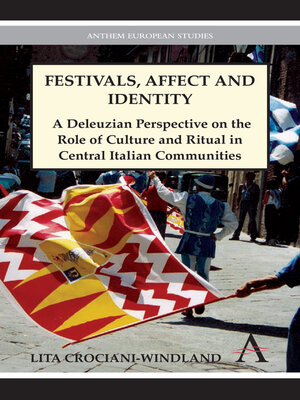Festivals, Affect and Identity
ebook ∣ A Deleuzian Apprenticeship in Central Italian Communities · Anthem European Studies
By Lita Crociani-Windland

Sign up to save your library
With an OverDrive account, you can save your favorite libraries for at-a-glance information about availability. Find out more about OverDrive accounts.
Find this title in Libby, the library reading app by OverDrive.



Search for a digital library with this title
Title found at these libraries:
| Library Name | Distance |
|---|---|
| Loading... |
Via an ethnographic study of the community festivals of Siena Province in central Italy, 'Festivals, Affect and Identity' investigates the affective and fluid aspects of reality to establish an integrated perspective on issues of continuity and rupture, tradition and modernity, and nature and culture. Offering an illustration of the explanatory power of continental philosophy, this text demonstrates the accessibility of highly abstract critical theory when examined in relation to specific events and their detailed analysis.
|'Festivals, Affect and Identity' offers an outline of areas of continental philosophy and critical theory, which involve high levels of abstractions, yet become more accessible when related to specific events and their detailed analysis. The case study material enables theories to become more understandable in relation to application, triangulation and comparison with different theoretical frameworks. It puts flesh on the 'hard to get hold of' nature of continental philosophy.
Maintaining continuity in the face of problems and ruptures and the interplay of fluidity and structure are central aspects explored and illustrated by ethnography focused on the affective dynamics of four festivals: the Palio in Siena and the Bravio in Montepulciano, both based on competitive territorial divisions; the Bruscello in Montepulciano and the Teatro Povero in Monticchiello, both theatres with links to sharecropping, a long established agrarian practice vanquished by modernity. The detailed analysis applied to this selection of case studies offers a grounding of theoretical concepts and an example of how these may be applied to analyse different phenomena. This approach sees the imprint of environmental and historical conditions as generative of a dynamic process of ever evolving community identities for which festivals provide expression, while also providing a way of living with them.







